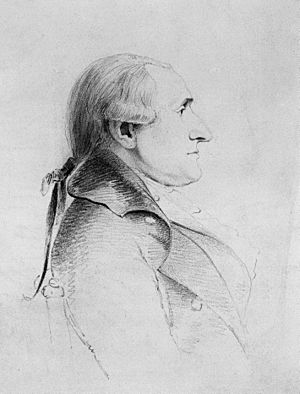Samuel Sharp (surgeon) facts for kids
Samuel Sharp (1709–1778) was an important English surgeon and writer. He worked at Guy's Hospital in London from 1733 to 1757 and became famous around the world. His book, A Treatise on the Operations of Surgery (first published in 1739), was the first British book to focus only on how to perform surgical operations. He was also a Fellow of the Royal Society, which means he was a very respected scientist.
Contents
Early Life and Training
Samuel Sharp was born around 1709. When he was about 15, in 1724, he began training to become a surgeon. He became an apprentice to William Cheselden, a well-known surgeon at St. Thomas's Hospital. Sharp paid a large sum of money for this training.
During his training, Sharp spent some time in France. There, he met the famous writer Voltaire. He also learned a lot about French surgery, which helped him greatly in his career. In 1731, he officially became a freeman of the Barber-Surgeons' Company, which was a group for surgeons at the time. He received his diploma to practice surgery in 1732.
His Work at Guy's Hospital
In 1733, Samuel Sharp was chosen to be a surgeon at Guy's Hospital. This was the same year his former teacher, William Cheselden, published a big book about bones called 'Osteographia'. Sharp helped Cheselden with this important work.
Sharp quickly became very busy with his medical practice. By 1746, he had so much work and was often sick with asthma. Because of this, he stopped giving his anatomy lectures. These lectures taught about the human body and surgical operations. He passed this teaching role to William Hunter, who later started a famous medical school. This school helped create modern ways of teaching medicine.
Traveling and Learning
In 1749, Sharp visited Paris again. While there, he was made a member of the Paris Royal Society of Medicine. He had already become a Fellow of the Royal Society in London earlier that year.
His trip to Paris led him to write another important book called A Critical Enquiry into the Present State of Surgery, published in 1754. This book shared interesting details about how surgery was done at that time, especially in French medical schools.
Lasting Impact on Surgery
Samuel Sharp stopped working at Guy's Hospital in 1757 because of his health. However, he continued to practice surgery until 1765. That year, he traveled through Italy during the winter. He wrote about his experiences in a book called Letters from Italy, published in 1766.
Sharp passed away on March 24, 1778. He is remembered as an important link between older surgical methods and modern surgery. His teacher was Cheselden, and William Hunter, a key figure in modern medicine, learned from Sharp's traditions. Sharp also helped improve surgical instruments. For example, he was one of the first to suggest that the barrel of a trephine (a tool used in brain surgery) should be shaped like a cone.
Besides his Letters from Italy, Sharp wrote other significant books:
- A Treatise on the Operations of Surgery, first published in London in 1739. This book was very popular and was translated into French and Portuguese.
- A Critical Enquiry into the Present State of Surgery, published in London in 1750. This book was also very popular and was translated into French, Spanish, German, and Italian. It had 13 short chapters on topics like hernia, lithotomy (removing bladder stones), and amputation.
Sharp also wrote two papers for the Philosophical Transactions, a scientific journal. In 1753, he wrote about a new way to open the eye to remove a cataract. In 1754, he wrote about the power of Agaric to stop bleeding.
 | Kyle Baker |
 | Joseph Yoakum |
 | Laura Wheeler Waring |
 | Henry Ossawa Tanner |


